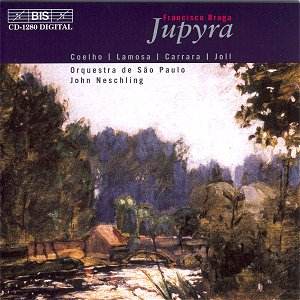The tone poem Cauchemar, (track 1) which means
"nightmare" in Portuguese, is much a product of its time,
similar in tone to contemporaneous works by Schoenberg, Massenet, Stravinsky
and Schmitt. This is not surprising since the composer was studying
in Europe at the time. Despite the title, there is nothing terribly
frightening about the music which has a mood rather somewhere between
the Rienzi overture of Wagner and something by Nielsen.
The opera Jupyra has as its story a rather typical
girl-loves-boy, boy-loves-another-girl, girl-has-boy-killed, girl-commits-suicide
plot, providing, as you can see, all sorts of opportunities for intensely
passionate music. Overall I could believe I was listening to La Boheme
or maybe Cavalleria Rusticana. The Orquestra de São Paulo
is a world class ensemble and plays beautifully and with commitment.
The singers all have international careers and bring the whole thing
off in first class style. There are some hummable tunes, some very tense
orchestral interludes, and some wrenchingly passionate ensembles (tracks
5 and 13).
The composer was born in Rio de Janeiro in 1868, orphaned
at the age of 8 and sent to a home for abandoned children. There he
began his music studies, eventually entering the conservatory and earning
in 1890 a scholarship to study in Europe. His early works were performed
in Dresden. Jupyra was almost translated into German and performed
there by Hermann Levi! The picture of the composer looks like a right
Parisian dandy, with pince-nez, cigar, and marcelled hair; his return
to Rio in 1900 for the premier of Jupyra must have raised some
eyebrows.
He was a teacher of Villa-Lobos but remained a European
at heart and took scant interest in modern Brazilian music. He remained
active in Brazilian musical circles composing nothing more of consequence
and died in Rio in 1945.
Persons specially interested in Latin American music
must have this disk, as should persons wanting one more Puccini opera.
Paul Shoemaker
